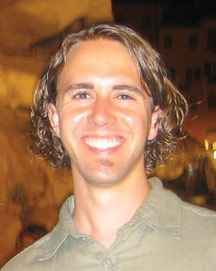Who: Ryan Andrade
From: Hollister, California
College: University of California, Davis
Major: Mechanical Engineering
Graduation Date: June, 2009
What first got you interested in your area of focus?
I am interested in design and control of electromechanical systems in the alternative energy industry. My interest originated from experiences I had as a 2nd year undergraduate engineering student in the UC Davis Hybrid Electric Vehicle (HEV) Center research group, where I helped design and build a prototype parallel Plug-In Electric Hybrid Vehicle (PHEV) and learned about energy and global climate issues. I decided to dedicate my career to working on innovative solutions to the global energy crisis.
 What has been your toughest challenge in higher education?
What has been your toughest challenge in higher education?
Managing to maintain a healthy balance between all of the different aspects of my professional and personal life.
What career/job/industry do you hope to be involved in after graduation?
The alternative energy industry, as a designer and engineer, with a particular interest in new ventures and startup companies.
What do you think is the most important issue facing our country and the world today, and do you have any opinions on possible solutions?
As I mentioned, I think the biggest problem we face revolves around energy: the way we use it, the sources we generate it from, how much of it we consume, etc. Any real solution to this problem will consist of a variety of approaches, including using our energy more efficiently, producing it more cleanly, and getting it from renewable, sustainable sources. In particular, I think that electrifying our transportation system, harnessing the sun through solar thermal and solar photovoltaic cells, continuing the development of clean nuclear power, and recycling wastes into fuels like biodiesel are key pathways toward solving our energy crisis.
Describe how the idea for your application of AutomationDirect products came about.
BioFuelBox is a startup waste-to-fuel company in San Jose, CA, that converts unusable waste products from animal tallow, wastewater treatment plants, etc. into ASTM-quality biodiesel fuel. I worked as a process engineering intern with BioFuelBox during the summer of 2008, and they subsequently sponsored my undergraduate engineering senior project.
The project entailed redesigning and optimizing process controls for a high pressure reactor on BioFuelBox’s pilot biodiesel plant. Automation-Direct’s DirectLOGIC 205 PLC was chosen as the process controller for this project, and AutomationDirect generously agreed to provide a free copy of their DataWorx software for data logging and control of the process.
Describe how the application works.
The application employs the DirectLOGIC 205 PLC as a feedback Proportional-Integral-Derivative (PID) controller to track setpoint changes and minimize disturbances in the control of the high pressure reactor on BioFuelBox’s pilot plant known as “Vessel Scrit.” A pressure transmitter on the reactor vessel measures the pressure, then relays the signal to the PLC, which compares the reactor pressure to the setpoint value and computes an appropriate action signal based on the standard PID control algorithm. The PLC then sends the signal to a control valve actuator on the back end of the reactor. Next, the control valve opens or closes accordingly to maintain the pressure at an ideal value for reaction.
AutomationDirect’s DirectSoft5 and DataWorx software packages were used to collect data from the system, model the system, and tune control parameters. Our efforts resulted in a pilot reactor with a highly optimized pressure control system, which in turn ensured the high pressure reactor would remain in its sweet spot for reaction, thus saving BioFuelBox money. AutomationDirect’s superior products and support were crucial to the success of this project.
At the beginning of this decade, there was a large drop in the number of U.S engineering students. As we see that number begin to rise again, what advice would you give to men and women considering this area of study?
I would commend them on their decision to consider engineering as a career path and strongly urge them to get some hands on experience in the field to see if it might be something they enjoy and/or find fulfilling. Engineering is a key part of every solution to the modern problems our society faces, particularly with regard to energy and climate issues. As an engineer, one has not only the opportunity, but indeed the moral responsibility, to use their technical skills, analytical thinking, and creativity to solve the problems of society. While this is not an easy task, I would advise that it is a necessary one, and one that for me so far has proven to be extremely rewarding.
Originally Published: Sept. 1, 2009

